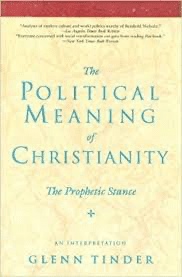The Political Meaning of Christianity: Chapter Two: The Individual and Prophetic Hope and Chapter Three: The Question of Liberty (pp. 80-116)
In the chapter section Tinder calls “The Individual and Prophetic Hope” he discusses the community and the individual with special attention to the church and the individual. However, he also comes to the paradox of the individual Christian and the secular world.
Clearly, Tinder holds to the model of “Christ and Culture in Tension” as spelled out in H. Richard Niebuhr’s classic book “Christ and Culture.” In this he is together with Reinhold Niebuhr and probably Karl Barth.
But first, in this chapter portion, Tinder argues that there is no such thing as churchless Christianity. The church is not the Kingdom of God but it is the community that anticipates and foreshadows the Kingdom of God and the individual Christian must have a tension-filled relationship with the church. He or she must be embedded faithfully in it while maintaining, for the sake of the prophetic stance, some degree of distance from it.
But I want to focus here on Tinder’s view of the individual Christian and social orders and ethics. He writes about “prophetic individualism” as “the notion that anyone who is steadily faithful to human beings in their destined exaltation, and to the truth in whose sharing community consists, is always going to be more or less alone, for society is not faithful to these things and cannot be.” (98) Christians, Tinder says, will always be “strangers in the world.” Part of the reason is that, in spite of having some general principles for social conduct, Christians “no only lack solid historical achievements; we lack coherent ideals and clear rules of political conduct.” (99)
Then comes the startling claim: “From a Christian perspective, human beings are dependent altogether on God—both for commands that give them knowledge of the acts they ought to perform and for the spirit to perform them. Rules are always conditional, not on one’s own personal ideas and preferences but on the requirements God places on human beings in their singular destinies.” (99)
Tinder seems to have Dietrich Bonhoeffer in mind. So do I.
So, according to Tinder, there are general guidelines Christians ought to keep in mind for “goals and policies” in the social and political realms, but they should maintain a certain distance from those to leave room for God to call. Is he thinking of something like Kierkegaard’s “teleological suspension of the ethical?” It seems so although he mentions instead John Locke’s “appeal to heaven” (to justify revolution). The two may be the same.
In spite of his strong valuation of the church, Tinder argues that each Christian ought to bear the “burden of singularity.” The individual Christian must never give himself or herself over without qualification or condition to any group or community or institution—religious or secular. The individual must always maintain the distance from them necessary to maintain the prophetic stance. No human community is infallible or invulnerable to criticism. I agree.
In “The Question of Liberty” and “Liberty and the Exalted Individual” Tinder explores the Christian meaning of liberty. He argues that ONLY true Christianity can fully undergird liberty even though non-Christians are capable of supporting and even establishing liberty. He wrestles with the meanings of “liberty” but emphasizes especially the paradoxes of individual liberty, finally saying that Christianity, thought out and practiced, leads to “a tragic liberalism.” Liberty is a high ideal because of the dignity of the individual even though liberty always comes with “obligatory inconsistency.” In other words, liberty cannot be unequivocal under the conditions of sin.
Again, I hear Tinder echoing Niebuhr even though he explicitly appeals to Dostoevsky. The two had a similarly complicated view of humanity, especially humanity in society. “Moral man and immoral society.” “If liberty were not continually interfered with, by public authorities, there would be much less of it. Thus, prophetic liberty is compelled to be inconsistent.” (114)
In my opinion, Tinder’s explications of the social implications of Christianity are striking partly because they conflict so dramatically with empirical Christianity in most of its expressions especially since Constantine. Here, in this book, Tinder is obviously NOT talking about “Christians” but “true Christianity” as a perspective rarely captured and lived out. That’s what makes it prophetic; it is prophetic especially towards the empirical Christianity of Christians.
Next, in two weeks, skipping over Easter, I will discuss “Liberty and Community” and “Tolerance” (pp. 116-133). We have two weeks, so please read it and keep up and have your own thoughts ready to express and questions to ask.
*Note: If you choose to comment, make sure you have read the relevant sections of Tinder’s book. If you have not, you may ask a question. In any case, make sure your comment (or question) is relatively brief (no more than 100 words), on topic, addressed to me, civil and respectful (not hostile or argumentative) and devoid of pictures or links.*














